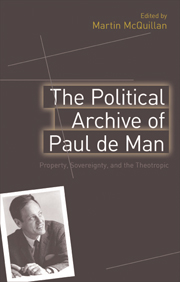Book contents
- Frontmatter
- Contents
- List of Abbreviations
- Acknowledgements
- Notes on Contributors
- Introduction: Broken Promises: Rousseau, de Man and Watergate
- 1 Lovence in Rousseau's Julie ou la Nouvelle Héloïse
- 2 Reading Spectacles in Rousseau's Letter to d'Alembert
- 3 The Utter Misery of the Human Mind: Apotropaic and Theotropic in de Man's Rousseau
- 4 Rhetoric and Rausch: de Man on Nietzsche on Value and Style
- 5 Theotropic Logology: J. Hillis Miller, Paul de Man and Kenneth Burke
- 6 Normativity, Materiality and Inequality: The Politics of the Letter in Paul de Man
- 7 Inscribing the Political: Paul de Man and the Wild Art of Letter Writing
- 8 Mistake in Paul de Man: Violent Reading and Theotropic Violence
- 9 Lightstruck: ‘Hegel on the Sublime’
- 10 De Man vs. ‘Deconstruction’: or, Who, Today, Speaks for the Anthropocene?
- 11 Paul de Man at Work: What Good is an Archive?
- 12 DNA: de Man's Nucleic Archive
- 13 Sovereign Debt Crisis: Paul de Man and the Privatization of Thought
- Appendix: Nietzsche I: Rhetoric + Metaphysics
- Index
8 - Mistake in Paul de Man: Violent Reading and Theotropic Violence
Published online by Cambridge University Press: 05 August 2013
- Frontmatter
- Contents
- List of Abbreviations
- Acknowledgements
- Notes on Contributors
- Introduction: Broken Promises: Rousseau, de Man and Watergate
- 1 Lovence in Rousseau's Julie ou la Nouvelle Héloïse
- 2 Reading Spectacles in Rousseau's Letter to d'Alembert
- 3 The Utter Misery of the Human Mind: Apotropaic and Theotropic in de Man's Rousseau
- 4 Rhetoric and Rausch: de Man on Nietzsche on Value and Style
- 5 Theotropic Logology: J. Hillis Miller, Paul de Man and Kenneth Burke
- 6 Normativity, Materiality and Inequality: The Politics of the Letter in Paul de Man
- 7 Inscribing the Political: Paul de Man and the Wild Art of Letter Writing
- 8 Mistake in Paul de Man: Violent Reading and Theotropic Violence
- 9 Lightstruck: ‘Hegel on the Sublime’
- 10 De Man vs. ‘Deconstruction’: or, Who, Today, Speaks for the Anthropocene?
- 11 Paul de Man at Work: What Good is an Archive?
- 12 DNA: de Man's Nucleic Archive
- 13 Sovereign Debt Crisis: Paul de Man and the Privatization of Thought
- Appendix: Nietzsche I: Rhetoric + Metaphysics
- Index
Summary
As readers versed in the polemics of twentieth-century literary theory will recognize, my title pays slant homage to a well-known essay by Stanley Corngold, ‘Error in Paul de Man’ (1982). In that essay, Corngold proposes a distinction between de Man's use of the terms ‘mistake’ and ‘error’: ‘Mistakes (or what de Man sometimes calls “mere error” [see, e.g., BI 109]) are without true value: trivial, in principle corrigible according to a norm already known. But the skew of error implies a truth.’ Having discerned this difference between mistake and error, Corngold proceeds to undermine it. He attempts to show that, although (in his opinion) ‘there is no place … for mistakes’ in a de Manian dialectic of blindness and insight, mistakes nonetheless persist in de Man's work in at least two ways: as straw figures that de Man's deconstructive essays construct in order to demolish (e.g., the totalizing power of metaphor: a power that, posited only to be destroyed over the course of de Manian argumentation, functions as ‘a sheer mistake'); and as ‘an unironical and sheerly mistaken violence’, to which de Man resorts in order to achieve his readings. Claiming that in the end ‘it is not possible to distinguish’ between mistake and error in de Man's writings, Corngold identifies the entire de Manian project as a mistake: ‘De Man's final confusion of the terms “error” and “mistake” occurs through his pretending to truth in the name of error. The usefulness of the concept of error as distinct from that of mistake disappears utterly.’
- Type
- Chapter
- Information
- The Political Archive of Paul de ManProperty, Sovereignty and the Theotropic, pp. 103 - 117Publisher: Edinburgh University PressPrint publication year: 2012

